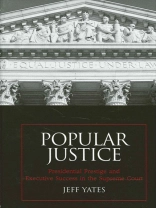Explores the interaction between the presidency and the U.S. Supreme Court.
Popular Justice explores the interaction between the presidency and the United States Supreme Court in the modern era. It assesses the fortunes of chief executives before the Court and makes the provocative argument that success is impacted by the degree of public prestige a president experiences while in office. Three discrete situations are quantitatively examined: cases involving the president’s formal constitutional and statutory powers, those involving federal administrative agencies, and those that decide substantive policy issues. Yates concludes that, while other factors do exert their own influence, presidential power with the Court does depend, to a surprising degree, on the executive’s current political popularity.
विषयसूची
Figures
Tables
1. Introduction
2. Presidential Prestige and Judicial Decision Making
3. Supreme Court Support for the Formal Constitutional and Statutory Powers of the President: Does Public Approval Promote Presidential Power with the Court
4. Presidential Power Via the Federal Agencies: Presidential Approval and Justice Voting on the President’s Bureaucratic Policy Implementers
5. Presidential Policy Signals and Supreme Court Justice Decision Making: Examining the Bounds of Presidential Influence on Justice Policy Voting
6. Conclusion
Notes
References
Index
लेखक के बारे में
Jeff Yates is Assistant Professor of Political Science at the University of Georgia.












